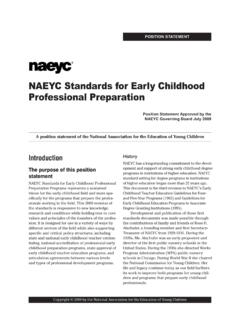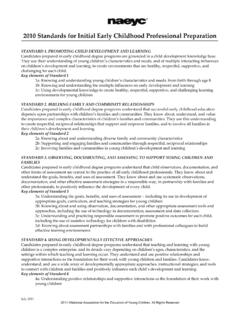Transcription of 21ST CENTURY KNOWLEDGE AND SKILLS IN EDUCATOR …
1 This paper has been produced as part of a collaborative project by the American Association of Colleges of Teacher Education and the Partnership for 21st CENTURY SKILLS (P21). Funding for the project was generously provided by Blackboard, ETS, Intel, National Education Association, Microsoft and Pearson. 21ST CENTURY KNOWLEDGE AND SKILLS IN EDUCATOR preparation September 20102A letter to EDUCATOR preparation leadersCore principles on 21st CENTURY SKILLS and EDUCATOR preparation IntroductionPreparing students for the 21st CENTURY economy What do P-12 students need to know and do? What do educators need to know and do? How can EDUCATOR preparation programs respond? Getting started Conclusion Bibliography Credits/Acknowledgments 34568111225272829 CONTENTS3It is hard to imagine a time when the opportunity and need to transform American education has been greater.
2 To be college and career ready today, student learning must go beyond mastery of core subjects and include 21st CENTURY KNOWLEDGE and SKILLS like critical thinking, communication, collaboration, and technology American Association of Colleges for Teacher Education (AACTE) and the Partnership for 21st CENTURY SKILLS believe new teacher candidates must be equipped with 21st CENTURY KNOWLEDGE and SKILLS and learn how to integrate them into their classroom practice for our nation to realize its goal of successfully meeting the challenges of this CENTURY . This is not a matter of teaching either academic or 21st CENTURY KNOWLEDGE and SKILLS . It s about fusing the two, so that our children meet the demands of a global economy, as well as engage in good citizenship and participate fully in a vibrant and civil society.
3 This paper is an important step in an effort to promote the inclusion of 21st CENTURY KNOWLEDGE and SKILLS formally into teacher preparation programs . In subsequent phases of this work, we hope to provide additional resources and technical assistance to support this effort among colleges of education late 2009, a shared sense of urgency prompted a group of deans to come together to consider how EDUCATOR preparation programs might embed 21st CENTURY KNOWLEDGE and SKILLS more effectively in their programs . The result of their effort is this paper, which was distributed to AACTE s membership in draft form for discussion at four sessions at the February 2010 Annual Meeting. This paper s goals are to: Help establish a shared vision around 21st CENTURY KNOWLEDGE and SKILLS in EDUCATOR preparation programs ; and Spark meaningful dialogue among higher education leaders (presidents, provosts, deans, and faculty) about implementing this vision in EDUCATOR preparation .
4 The work to date reflects a great deal of feedback received at the AACTE conference as well as through a widespread call for feedback. The paper s themes are also reflective of a number of recent developments in P-12 education. The final standards released by the Common Core State Standards Initiative in June 2010 include many of the 21st CENTURY SKILLS outlined in this paper, which will be required across disciplines. It is expected that acquisition of these SKILLS will be also be reflected in the work of the National Council for Accreditation of Teacher Education s (NCATE) Blue Ribbon Panel on Clinical preparation , Partnerships and Improved Student Learning and the Interstate New Teacher Assessment and Support Consortium (INTASC) revision of the INTASC Model Standards for Beginning Teacher Licensing, Assessment and Development.
5 We are hopeful this white paper will stimulate conversation and ideas that can enrich your transformative efforts. Against the backdrop of a severe downturn in our economy, changing state and national policies, and rising accountability and expectations, the challenges of embedding 21st CENTURY KNOWLEDGE and SKILLS are great. Great challenges require bold leadership. We hope you will join us in advancing EDUCATOR preparation so that every child will thrive in their personal life, their community and the P. Robinson President/CEO, AACTEKen Kay President, Partnership for 21st CENTURY SkillsA LETTER TO EDUCATOR preparation LEADERS4 The American Association of Colleges for Teacher Education (AACTE) advisory group and the strategic council of the Partnership for 21st CENTURY SKILLS have approved the following core principles, representing a shared vision for integrating 21st CENTURY SKILLS into EDUCATOR P-12 education will prepare all students with 21st CENTURY KNOWLEDGE and P-12 teachers and administrators will possess, teach and assess 21st CENTURY KNOWLEDGE and EDUCATOR preparation programs will prepare their graduates to possess, teach and assess 21st CENTURY KNOWLEDGE and SKILLS .
6 4. New teachers will be prepared to become change agents for embedding 21st CENTURY KNOWLEDGE and SKILLS in all subjects in P-12 curricula in accordance with national and state Higher education leaders will work with leaders in P-12 and local communities to inform the redesign of EDUCATOR preparation programs to more effectively meet the needs of 21st CENTURY Each EDUCATOR preparation program will develop a 21st CENTURY blueprint for transforming itself into a 21st CENTURY program. 7. EDUCATOR preparation programs will be recognized as sources of leadership in developing 21st CENTURY education and learning EDUCATOR preparation programs will be at the forefront of research and evaluation of 21st CENTURY PRINCIPLES ON 21ST CENTURY SKILLS AND EDUCATOR PREPARATION5 This is an exciting and challenging time for teacher educators.
7 The nature of teaching is changing. In an effort to transform themselves into exemplary EDUCATOR preparation institutions, many programs are becoming more entrepreneurial, recognizing new opportunities and making changes required to respond to the needs of 21st CENTURY learners. Many are successfully engaged in strategies such as: Providing high-quality alternative routes to teaching, Building on private and public partnerships that share common sets of ideas in advancing education reforms, Effectively partnering with urban schools to prepare teacher candidates to teach in urban environments with large numbers of culturally and linguistically diverse learners, Playing a greater role with charter and other experimental/alternative schools, Effectively recruiting career changers to build the teacher workforce, Creating a robust clinical experience for teacher candidates, including year-long teaching residency programs , and Growing a network of over 1,000 professional development schools designed after the medical model of clinical order to meet the challenges and demands of the profession.
8 AACTE is leading reform efforts that: Provide evidence that the teachers prepared at member institutions will have a positive effect on their students learning, Go beyond providing content KNOWLEDGE and prepare teachers to differentiate their instruction to reach all children, especially those most at risk for school failure: children with disabilities, English language learners, and children from low-income homes, Ensure that teacher candidates receive extensive, in-depth clinical experiences with mentoring support that requires performance evaluation tied to the teacher licensure process and high standards for beginning practice, Create fast-track, yet high-quality, teacher preparation programs in close partnership with school districts to meet specific teacher shortages, To keep America competitive, and to make the American dream of equal educational opportunity a reality, we need to recruit, reward, train, learn from, and honor a new generation of talented teachers.
9 But the bar must be raised for successful teacher preparation programs because we ask much more of teachers today than even a decade ago. Today teachers are asked to achieve significant academic growth for all students at the same time that they instruct students with ever-more diverse needs. Teaching has never been more difficult, it has never been more important, and the desperate need for more student success has never been so urgent. Are we adequately preparing future teachers to win this critical battle? Secretary of Education Arne Duncan, 2009 INTRODUCTION6 Engage prospective teachers in creating instruction aligned with their state s curriculum standards, effectively interpreting assessment results, responding to students learning needs, and cultivating a passion for learning that will support students for a lifetime, and Meet the demands of the global economy by exemplifying, and embedding in instruction, the mastery of 21st CENTURY SKILLS such as critical thinking, problem-solving, communication, collaboration and creativity and innovation.
10 This includes the application of technology to support more robust instructional methods and understanding the relationship between content, pedagogy and technology through dissemination of Technological Pedagogical Content KNOWLEDGE (TPCK) theory and research (American Association of Colleges of Teacher Education 2008, US Department of Education 2010).While all of these efforts are interconnected and critical to the transformation of EDUCATOR preparation , the purpose of this paper is to create the foundation for ongoing dialogue around how 21st CENTURY KNOWLEDGE and SKILLS can be appropriately embedded in EDUCATOR preparation , and to guide the development of resources and services to support EDUCATOR programs . With your help we intend to: Develop a blueprint for building the models, tools, resource base, and capacity needed to support this work, Create an infrastructure of leadership and communications that will support the contributions of EDUCATOR preparation programs and other key stakeholders to this initiative, and Provide faculty training and resource pilot initiatives and partnerships to develop and test 21st CENTURY instructional models among higher education institutions (Cont.)

















